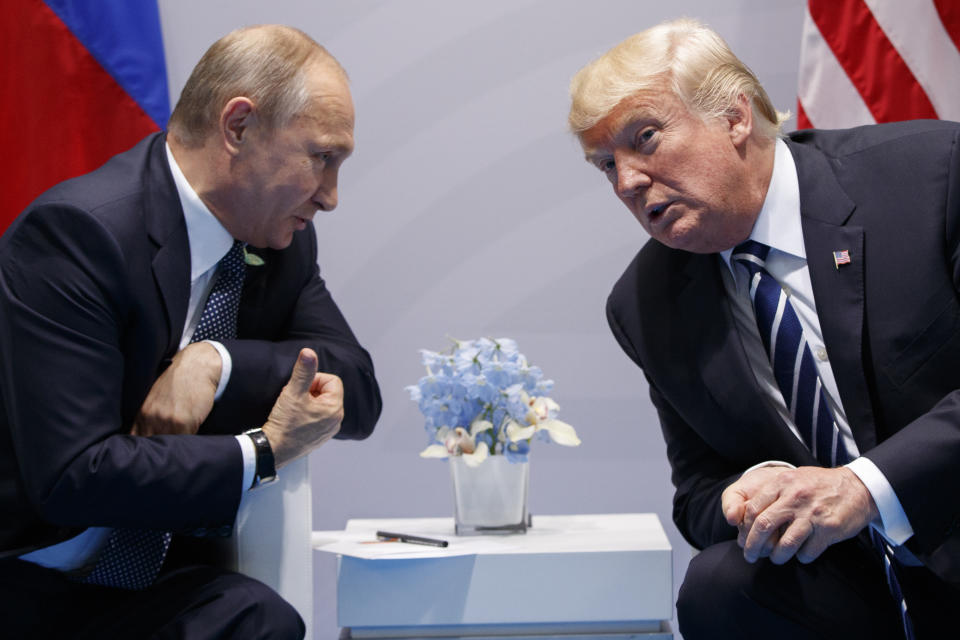Fund manager explains why he estimates Putin's net worth to be $200 billion
Vladmir Putin could be worth an estimated $200 billion dollars, much of which is drawn from Russia’s oligarchs. That’s according to fund manager Bill Browder, whose fund Hermitage Capital had as much as $4.5 billion invested in the country at one point.
Putin’s 2003 arrest of the richest man in Russia, Michael Khodorkovsky (which included a televised trial with Khodorkovsky in a cage) prompted approximately twenty oligarchs in the country to plead with Putin, asking what they could do to avoid that fate, Browder explained.
“His response was: ‘50%'” Browder said. “Not 50% to the Russian government, not 50% to the presidential administration of Russia. 50% to Vladmir Putin. And at that moment in time, Putin effectively became the richest man in the world. I estimate his net worth to be $200 billion.”
Putin’s wealth, very much intertwined with the oligarchs, is invested throughout the world.
“None of the money is in his own name,” Browder said. “The money is held by what I call ‘oligarch trustees,’ people who are trusted friends of his who hold the money on his behalf. They’re holding the money in the west, in hedge funds, in private equity funds, in real estate, in football teams and other things like that.”
“A lot of the money sloshing around in real estate and in the world of finance belongs to Vladmir Putin and his oligarch trustees,” Browder added.
Sanctions on oligarchs are effective
It is this very dynamic that has prompted the United States to impose sanctions on individuals in Russia after Browder’s lawyer died in prison and again after Russia annexed the Ukrainian peninsula of Crimea.
“The most important sanctions on Russia from an effectiveness standpoint are the individual sanctions,” Browder explained. “The reason for that is because in Russia, unlike other countries, all the money is held by a very few number of people. So if you sanction those people and their wealth, that gets you to the decision makers.”

That’s not to say that sanctions against Russian corporations—including in the energy, transportation, and financial industries—aren’t effective.
“But the individual sanctions are the ones that most upset because it hits [Putin] close and it hits the people around him close,” Browder said.
With the Russian economy in an unhealthy position, Putin has pushed for sanctions to be lifted.
Donald Trump Jr. emails
Natalia Veselnitskaya, the Russian lawyer that met with Donald Trump Jr., was targeting those very sanctions on behalf of the government, Browder says.
Veselnitskaya, who said she was not working for the government as described in the revealed pre-meeting emails, ultimately talked to the Trump team about the adoptions of Russian orphans, according to Donald Trump Jr’s initial characterization of the meeting.
But even the seemingly innocent subject of adoption relates back to sanctions imposed on individuals in Russia.
The Magnitsky Act, signed into law by President Obama in 2012, freezes assets and bans visas of Russian human rights violators, including the people responsible for the 2009 death of Browder’s lawyer Sergei Magnitsky. And Putin’s response to the legislation, to ban the adoption of orphans from Russia by American families, ties adoptions and sanctions together.

“[The meeting] has nothing to do with adoptions,” Browder said. “[Veselnitskaya] was talking about repealing the Magnitsky Act… The whole exercise was a Russian government project.”
“These Russians keep all their money in the west and they travel to the west,” Browder said. “Putin is now shaking in his shoes because he believes that at some point in time some or all of his money will be frozen in the west. So it’s become the single largest Putin foreign policy priority to have the Magnitsky Act repealed,” Browder said.
If Browder’s estimate of Putin’s wealth is accurate, the Russian president’s $200 billion net worth would be just short of the combined net worth of Bill Gates, Jeff Bezos and Warren Buffett, the three wealthiest people in the world according to Forbes.
—
Nicole Sinclair is markets correspondent at Yahoo Finance.
More from Bill Browder:
Bill Browder: ‘You don’t just risk losing your money in Russia, you risk dying’
Please also see:
America doesn’t need to be the world leader to prosper
Bank of America CEO: Why it matters that 21% of our deposits are made through mobile
Low oil prices are hurting Pepsi’s business
The No. 1 concern for companies during this earnings season
Retail dwarfs coal, and yet Trump has said little about massive job losses

 Yahoo Finance
Yahoo Finance 
